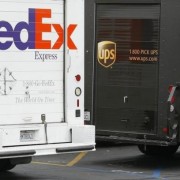Breaking: FedEx Announces 2018 Rate Increases
JUST IN: FedEx Announces 2018 Rate Increases–Parcel and LTL Rates on the Rise AGAIN!
–To download your 2017 VS. 2018 FedEx Comparison Charts free of charge click here —
It should come as no surprise to parcel, and LTL shipper’s for that matter, that they will once again be faced with higher prices come the New Year. This is an annual ritual called “Annual General Rate Increases” and the first major parcel carrier to announce these increase is FedEx. You can bet that UPS’ announcement of their Annual General Rate Increases will be right around the corner.
So here is a look at what the increase will look like and how it will affect FedEx parcel and LTL shippers starting on January 1, 2018.
Effective Monday, January 1, 2018, the following FedEx rates will be affected by the General Rate Increase FedEx announced on Tuesday, September 19, 2017.
- FedEx Express
- FedEx Ground
- FedEx Home Delivery
- FedEx Smart Post
- FedEx Freight
FedEx Express Package and Freight Standard Rates will increase “an average” 4.9% for US, US Export and US Import shipments.
FedEx Ground and FedEx Home Delivery Standard list rates will also increase “an average” 4.9%
FedEx Freight rates will also increase “an average” of 4.9%
The key words here are “an average” which obviously means that some rate increases will be lower than the 4.9% and that’s the good news, but some rates will be increased even higher and that’s obviously the bad news. How will your shipments be affected by these increases? That will require a deep dive into your shipment characteristics to determine exactly how your company will be affected by these increases. And, if your company does not have access to the granular shipping characteristics data, then you will be in for a big surprise in the New Year.
If you’re a FedEx One Rate Pricing customer, there is some good news for you, the average increase for those rates will only be 3.5%, sounds like a bargain to us.
FedEx also announced that effective January 22, 2018, they will make changes to their Additional Handling, Oversize and Ground Unauthorized Surcharges, as follows:
- Additional Handling
The Additional Handling Surcharge will apply to any FedEx US or International Express package that measures greater than 48 inches along its longest side. All other Additional Handling Surcharge size, weight and packaging parameters remain unchanged.
- Oversize Charge
The oversize Charge will apply to any FedEx Express US package or FedEx Ground package exceeding 96 inches in length or 130 inches in length and girth. The shipping charges for an Oversize package will be based on the greatest of the packages actual rounded weight, dimensional weight and 90 pounds.
The shipping charge for a Ground Unauthorized package will be based on the greatest of the packages actual rounded weight, dimensional weight and 90 pounds.
- Third Party Billing Surcharge
A Third Party Billing Surcharge will apply to shipments that are billed to a Third Party. The surcharge will be charged to the third-party payer of the freight charges. FedEx recommends that all shipper’s review the FedEx Service Guide for their definition of a “Bill Third Party” shipment, that is sound advice.
For all FedEx Express and FedEx Ground US and International shipments, the surcharge will be 2.5% of “TOTAL” shipment charges, so that includes Fuel as well as any other d=fees associated with the shipment.
FedEx points out that the surcharge applies when the shipper account number and the third party billing account number are NOT part of the same company.
- FedEx Freight Over Length Surcharge
The FedEx Freight Over Length Surcharge will apply to shipments that contain any handling unit with a dimension of 8 feet or greater in length and less than 12 feet in length. Multiple piece shipments that qualify for both the Extreme Length Surcharge and the Over Length Surcharge will be charged only the Extreme Length Surcharge.
- Dimensional Weight Pricing for SmartPost
FedEx will also implement a Dimensional Weight Factor of 139 for all SmartPost packages. This pricing change can have quite an impact on shippers who previously utilized SmartPost services as a means to keep their shipping costs under control.
Let’s also not forget that FedEx is implementing increased shipping surcharges for the upcoming holiday season which become effective on November 20, 2017 and will continue in effect until December 24, 2017. Those surcharges were detailed in our Logistics blog at www.icclogistics.com on August 7, 2017. The bottom line, it will be financially painful this holiday season and you can bet for every holiday shipping season from now on.
Not sure how your company will be impacted by these FedEx increases? Contact ICC Logistics at 516 822-1183 and speak to one of our experts and let us help you navigate the very muddy waters of these General Rate Increases.
To download your 2017 VS. 2018 FedEx Comparison Charts free of charge click here






